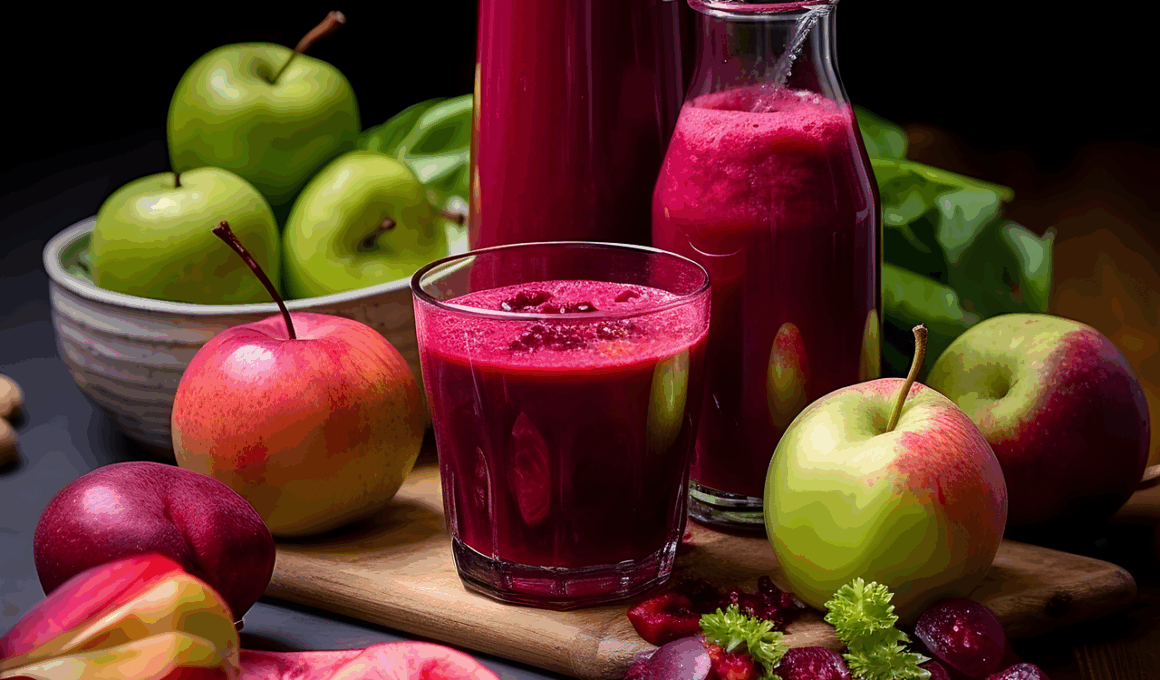Detoxing After the Holidays: Resetting for Weight Loss
The holiday season, often filled with indulgent feasting, can take a toll on our bodies, leading many to seek effective detox methods for weight loss. After such festivities, detox diets can help reset your metabolism, cleanse your system from excesses, and refocus on health. Prioritizing detoxification can kickstart your journey into the new year, allowing your body to shed unnecessary weight gained during celebrations. One of the common approaches to detox for weight loss is following a structured plan that includes juicing and raw foods. This way, you can replenish essential vitamins and minerals while significantly decreasing caloric intake. Whole fruits and vegetables, such as beets and leafy greens, possess natural detoxifying properties that enhance liver function and promote waste elimination. Incorporating herbal teas or detox drinks featuring lemon, ginger, and cayenne pepper can amplify effects, too. Remember to stay hydrated throughout your detox process to assist your kidneys in flushing out toxins. Ultimately, combining your detox diet with mindful eating habits teaches your body to recognize hunger signals, equipping you with lasting skills to maintain weight loss.
Choosing the Right Detox Plan
When it comes to detox for weight loss, selecting the right plan is crucial for success. Many options are available, ranging from juice cleanses to elimination diets. Juice cleanses involve consuming a variety of vegetable and fruit juices, allowing the digestive system to rest while providing an influx of nutrients. Alternatively, elimination diets focus on cutting out processed foods, sugars, and other irritants, instead opting for whole food options. Both methods can catalyze weight loss efforts and pave the way for restored energy levels. Regardless of the chosen strategy, ensure it aligns with your lifestyle, dietary preferences, and medical needs. Consulting with a healthcare professional can help you craft the best plan tailored to your unique needs. It’s important to address any pre-existing conditions or dietary restrictions, as the detox plan should not cause harm. Additionally, ensure the plan is sustainable; extreme methods can lead to rebound weight gain post-detox. Gradually reintroducing healthy foods and habits is essential for long-term maintenance. This balance will foster a healthier relationship with food and help establish a consistent, fulfilling routine.
Detoxing can also be greatly enhanced by integrating consistent physical activity. Exercise supports the body’s natural detoxification processes by improving circulation and promoting lymphatic drainage. Activities such as yoga or moderate cardio can further aid in stress reduction, which is essential after the holiday hustle and bustle. Stress often manifests itself in cravings and unhealthy eating patterns, so tackling it head-on through activities you enjoy is beneficial. It’s imperative to find forms of exercise that resonate with you, making movement enjoyable rather than a chore. Engage in outdoor activities, group classes, or home workouts—all of which can invigorate your spirit while contributing positively to your detox journey. Strength training can also be a wonderful addition, helping build muscle and boost metabolism. Aim for at least 150 minutes of moderate-intensity activity weekly. Power up your cleansing diet with nutrient-rich smoothies that support recovery after workouts. Pair your exercises with a well-rounded detox diet ensures you’re getting the necessary nutrients to fuel your body and facilitate weight loss. Ultimately, aiming for balance in both diet and exercise will yield sustainable results.
Mindfulness in Eating
Alongside detoxing, practicing mindfulness can enhance weight loss efforts. Mindful eating encourages awareness of food choices and portion sizes, creating a healthier relationship with what you consume. This practice begins with slowing down during meals, appreciating textures, and recognizing hunger and fullness signals. Avoid distractions such as smartphones or television while eating, as they can lead to unconscious overeating. Instead, savor the flavors of your food, which promotes gratitude and enhances satisfaction. As a result, you’ll develop a deeper understanding of when to eat and when to stop. One effective strategy is to serve smaller portions and wait before considering seconds; often, our minds trick us into thinking we need more food. Incorporate nutrient-dense foods rich in fiber, as they help promote fullness and irrational cravings throughout the day. Additionally, celebrate your successful choices, whether selecting a salad over fried options or stopping when you’re content. Allowing yourself to indulge occasionally can prevent feelings of deprivation while reinforcing mindful habits. Overall, mindfulness is a powerful tool to effectively support both detox diets and lasting weight loss.
Incorporating herbs and spices into your detox regimen can significantly enhance flavor and health benefits. Ingredients such as turmeric, garlic, and cilantro are known for their detoxifying properties and can aid in digestion, further supporting weight loss. Turmeric, with its active compound curcumin, is particularly celebrated for its anti-inflammatory benefits and ability to enhance liver function. Likewise, garlic contains compounds that assist in detoxification processes while boosting immunity. Cilantro can help eliminate heavy metals and other toxins from your body, making it an excellent addition to salads or smoothies. Experiment with these ingredients to develop delicious and nourishing meals. Additionally, consider adding green tea or dandelion root tea to your daily routine, both known for supporting liver health and boosting metabolism. It’s essential to be creative while preparing meals, as flavorful foods can make detoxification less daunting. Not only will you be nourishing your body, but you’ll also enjoy the preparation process. Food is meant to be savored; find recipes that inspire you and encourage exploration of various tastes and textures. This will enhance the detox experience and make it truly enjoyable.
Hydration: The Key Component
No detox diet is complete without recognizing the importance of hydration. Drinking adequate water supports every bodily function and plays a pivotal role in detoxification. Water helps flush out toxins and waste, supports digestion, and keeps your skin looking great. Aim for at least eight glasses of water daily, increasing your intake if engaging in physical activity. You can infuse tap or bottled water with fruits and herbs to make hydration more enjoyable. Infused water not only tastes great but also delivers additional nutrients that boost health and detoxification processes. Consider combinations like lemon and mint or cucumber and ginger to refresh your palate. Herbal teas also offer hydration benefits while providing additional detox support. Drink green tea for its antioxidant properties or peppermint tea to soothe digestive discomfort. Keep a water bottle with you to encourage regular sips throughout the day. Staying mindful of your hydration will help you feel energized and ready to tackle whichever challenges arise. Remember that hydration will also play a contributory role in your overall weight loss journey.
After your detox experience concludes, it’s vital to maintain the healthy habits established during this time. One effective method is to gradually reintroduce solid foods while continuing to focus on nutrient-dense choices. Aim for a balanced diet that emphasizes whole foods such as fruits, vegetables, lean proteins, and whole grains. Avoid processed foods, added sugars, and unhealthy fats to maintain cleansing effects. This focus on healthful eating will help sustain weight loss achieved during your detox. Additionally, foster habits such as meal prepping and planning to ensure you have nutritious options ready at all times. Helping your body adjust post-detox is essential, as reintroducing unhealthy foods can negate all your hard work. Continue practicing mindfulness, journaling about your relationship with food, and seeking support when needed. Regular check-ins with your goals can also help to remain accountable. Additionally, setting and celebrating personal goals along the way will keep you motivated. In time, these habits and practices can become second nature, resulting in long-lasting benefits to your overall health and wellbeing. Remember that the journey is just as important as the destination.


